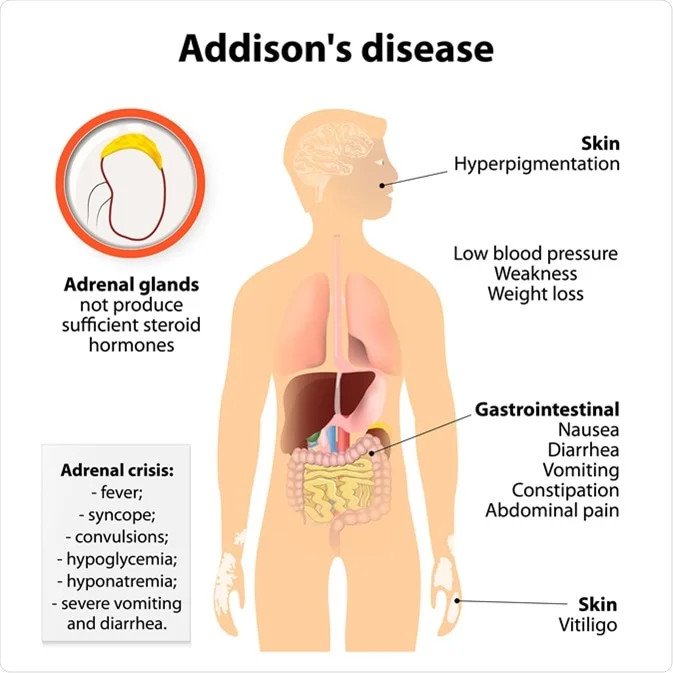Definisi
Penyakit Addison, yang disebut juga dengan insufisiensi adrenal primer atau hipoadrenalismesss, adalah suatu kelainan langka dari kelenjar adrenal. Kelenjar adrenal adalah dua kelenjar kecil yang terletak di atas ginjal. Kelenjar ini memproduksi 2 hormon penting yaitu kortisol dan aldosteron. Penyakit Addison memengaruhi kelenjar adrenal sehingga produksi hormon kortisol dan aldosteron akan terganggu.
Kortisol adalah hormon yang diproduksi tubuh sebagai respon terhadap stres, juga berperan untuk menjaga tekanan darah, fungsi jantung, sistem kekebalan tubuh, dan kadar gula darah. Sementara itu, hormon aldosteron memengaruhi keseimbangan natrium dan kalium dalam darah, serta mengontrol jumlah cairan yang dikeluarkan sebagai urine.
Penyebab
Penyakit Addison terjadi ketika terjadi kerusakan pada lapisan luar kelenjar adrenal (korteks adrenal), yang bisa menurunkan produksi kadar hormon kelenjar adrenal.
Gangguan pada sistem imun atau kekebalan tubuh menjadi penyebab terbanyak dari penyakit Addison. Sistem imun berperan sebagai mekanisme pertahanan tubuh dalam melawan infeksi dan penyakit. Jika Anda sakit, sistem imun akan memproduksi antibodi, suatu jenis protein yang menghancurkan organisme pembawa penyakit dan toksin. Namun, jika terjadi gangguan pada sistem imun, sel-sel kekebalan tubuh dapat mulai menyerang jaringan dan organ tubuh sendiri yang sehat, karena salah membedakan sel tubuh yang sehat sebagai zat asing.
Gangguan imun tersebut bisa membuat sel-sel kekebalan tubuh untuk menyerang kelenjar adrenal, dan terjadi kerusakan berat pada bagian korteks adrenal. Bila 90% dari korteks adrenal mengalami kerusakan, kelenjar adrenal tidak akan mampu memproduksi hormon kortisol dan aldosteron dalam jumlah yang cukup sesuai kebutuhan tubuh. Ketika kadar hormon adrenal mulai turun, Anda akan mengalami gejala penyakit Addison.
Belum jelas mengapa ada individu yang mengalami gangguan sistem imun, meskipun kondisi imun seperti ini dapat diturunkan di keluarga. Kondisi medis lain yang mungkin dapat merusak kelenjar adrenal contohnya adalah infeksi tuberkulosis, infeksi kelenjar adrenal, kanker yang menyebar ke kelenjar adrenal, atau perdarahan pada kelenjar tersebut.
Faktor Risiko
Penyakit Addison dapat terjadi pada semua orang dengan usia berapapun, namun paling sering terjadi pada kelompok usia 30-50 tahun. Kondisi ini juga lebih sering ditemukan pada wanita dibandingkan pria. Ada juga kondisi medis yang bisa meningkatkan risiko pasiennya untuk mengalami bentuk autoimun dari penyakit Addison, di antaranya:
- Diabetes melitus tipe 1
- Tiroiditis kronis, kondisi peradangan kelenjar tiroid
- Vitiligo, kondisi ketika kulit kehilangan warna aslinya, dll.
Gejala
Gejala dari penyakit Addison umumnya berkembang secara perlahan dalam kurun waktu berbulan-bulan. Karena gejala yang muncul awalnya bisa terlihat ringan, pasien bisa tidak mengindahkan keluhan yang dialaminya. Oleh karena itu, penyakit Addison dapat sulit untuk terdeteksi pada awalnya. Kemudian, suatu penyakit atau cedera bisa mulai memperburuk gejala.
Gejala yang bisa terlihat pada penyakit Addison meliputi:
- Kekurangan energi atau kelelahan yang berlebihan
- Kelemahan otot yang disertai kram
- Suasana hati yang buruk atau mudah tersinggung
- Kehilangan nafsu makan dan penurunan berat badan yang tidak disengaja
- Sering merasa haus
- Pusing terutama saat berdiri
- Tekanan darah rendah (hipotensi)
- Bercak-bercak pada kulit yang lebih gelap dari sekitarnya (hiperpigmentasi)
- Warna bibir atau gusi menjadi lebih gelap
- Mendambakan makanan asin
- Nyeri perut atau kepala
- Peningkatan frekuensi buang air kecil
- Sulit berkonsentrasi
- Kadar gula darah rendah, dll.
Diagnosis
Untuk membantu diagnosis penyakit Addison, dokter akan melakukan wawancara medis dengan bertanya mengenai keluhan serta riwayat medis Anda. Informasikan juga mengenai riwayat penyakit pada anggota keluarga yang Anda ketahui, terutama bila ada yang memiliki penyakit autoimun.
Selanjutnya, pemeriksaan fisik akan dilakukan pada seluruh tubuh untuk. Tanda-tanda vital seperti tekanan darah, denyut nadi, napas dan suhu akan diperiksa. Bisa ditemukan tekanan darah rendah, terutama ketika terjadi perubahan posisi dari berbaring lalu bangun. Dapat juga ditemukan bercak kulit berwarna gelap, terutama pada area seperti lipatan telapak tangan dan lipatan siku. Bibir dan gusi juga terlihat lebih gelap. Namun, bercak hiperpigmentasi ini tidak terjadi pada semua kasus penyakit Addison.
Pemeriksaan penunjang kemudian dilakukan untuk menunjang diagnosis. Pemeriksaan yang dapat disarankan oleh dokter adalah:
- Pemeriksaan elektrolit seperti natrium dan kalium di tubuh
- Pemeriksaan hormon kortisol, aldosteron dan ACTH
- Pemeriksaan gula darah
- Pemeriksaan antibodi adrenal
Jika kortisol darah Anda rendah atau gejala Anda sangat mengacu pada penyakit Addison, Anda akan membutuhkan tes stimulasi synacthen untuk mengkonfirmasi diagnosis. Synacthen adalah hormon ACTH sintetis. ACTH diproduksi secara alami oleh kelenjar hipofisis di otak untuk menstimulasi pelepasan hormon kortisol dan aldosteron oleh kelenjar adrenal. Ketika synacthen diberikan, kelenjar adrenal seharusnya memberi respon yang sama seperti respon terhadap ACTH.
Jika kadar ACTH tinggi namun kortisol dan aldosteron rendah, biasanya hal ini mengonfirmasi penyakit Addison.
Tata Laksana
Penyakit Addison ditangani dengan obat untuk menggantikan hormon yang hilang. Anda akan memerlukan obat ini seumur hidup Anda.
Dengan terapi, gejala penyakit Addison sebagian besar dapat dikontrol. Kebanyakan orang dengan kondisi ini dapat menjalani kehidupan yang aktif dengan sedikit keterbatasan. Terkadang, penyakit penyebab yang mendasari penyakit Addison dapat diobati. Sebagai contoh, bila penyakit Addison disebabkan oleh infeksi TB, infeksi tersebut bisa ditangani dengan pemberian antituberkulosis selama minimal 6 bulan.
Namun, kebanyakan kasus penyakit Addison disebabkan oleh gangguan pada sistem imun yang sulit disembuhkan.
Komplikasi
Orang dengan penyakit Addison harus senantiasa berhati-hati terhadap risiko perburukan gejala yang mendadak. Kondisi ini disebut sebagai krisis adrenal, dapat terjadi ketika kadar kortisol dalam tubuh turun dengan drastis. Krisis adrenal bisa dicetuskan oleh stres fisik yang berat setelah menjalani suatu prosedur operasi atau karena mengalami penyakit lain seperti infeksi.
Selama krisis adrenal, gejala penyakit Addison muncul dengan cepat dan berat. Tanda krisis adrenal meliputi:
- Dehidrasi berat
- Pusing
- Berkeringat
- Napas cepat dan dangkal
- Kulit pucat, dingin, dan lembap
- Tekanan darah rendah (hipotensi)
- Muntah dan diare berat
- Nyeri perut atau kepala
- Kelelahan dan kelemahan otot berat
- Penurunan kesadaran
Krisis adrenal merupakan kondisi gawat darurat yang memerlukan penanganan segera. Bila tidak ditangani, bisa terjadi koma hingga kematian. Selain itu, terdapat risiko jaringan otak tidak mendapatkan cukup oksigen jika terapi tidak segera dilakukan, yang bisa menyebabkan disabilitas permanen.
Pencegahan
Sampai saat ini, belum ada langkah pencegahan yang diketahui bisa mencegah terjadinya penyakit Addison pada seseorang. Namun pada pasien penyakit Addison, krisis adrenal bisa dicegah dengan mengenali gejala pada tubuh dan segera mencari bantuan medis bila mengalami keluhan berat.
Kapan Harus ke Dokter?
Anda bisa berkonsultasi ke dokter umum atau dokter spesialis penyakit dalam bila mengalami keluhan di atas dalam waktu lama, yang tidak kunjung hilang setelah pengobatan. Diharapkan gejala tersebut dapat diinvestigasi lebih lanjut.
Mau tahu informasi seputar penyakit lainnya? Cek di sini, ya!
- dr Hanifa Rahma
Addison's disease (2021) NHS choices. NHS. Available at: https://www.nhs.uk/conditions/addisons-disease/ (Accessed: April 14, 2023).
Addison's disease (2022) Mayo Clinic. Mayo Foundation for Medical Education and Research. Available at: https://www.mayoclinic.org/diseases-conditions/addisons-disease/symptoms-causes/syc-20350293 (Accessed: April 14, 2023).
Addison's disease: What it is, causes, symptoms & treatment (2022) Cleveland Clinic. Available at: https://my.clevelandclinic.org/health/diseases/15095-addisons-disease (Accessed: April 14, 2023).












